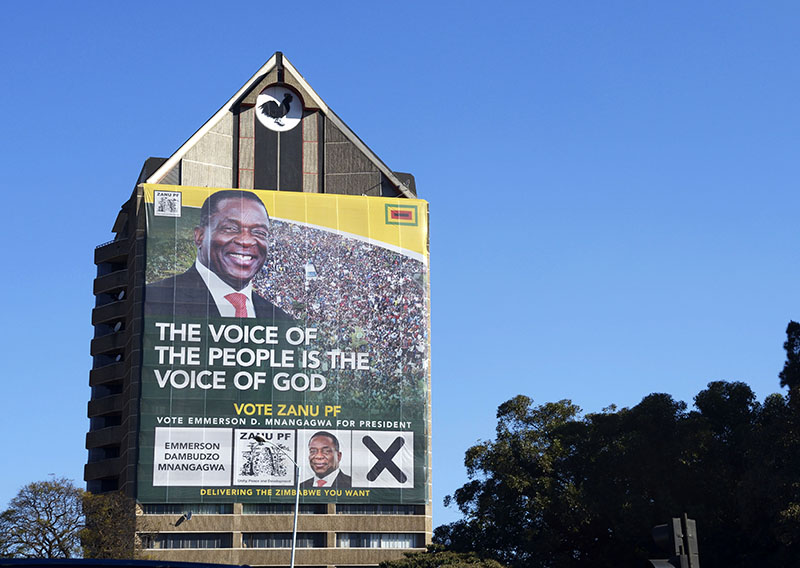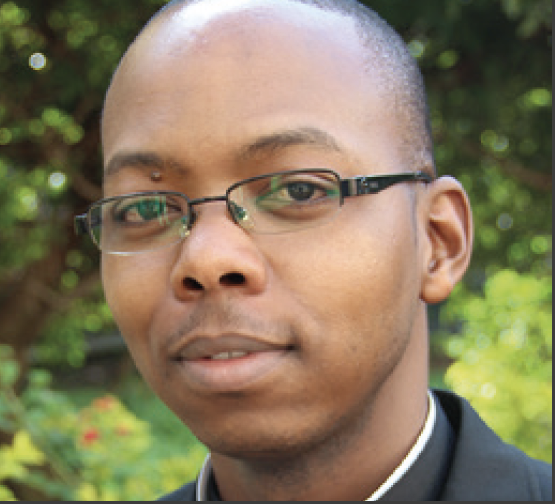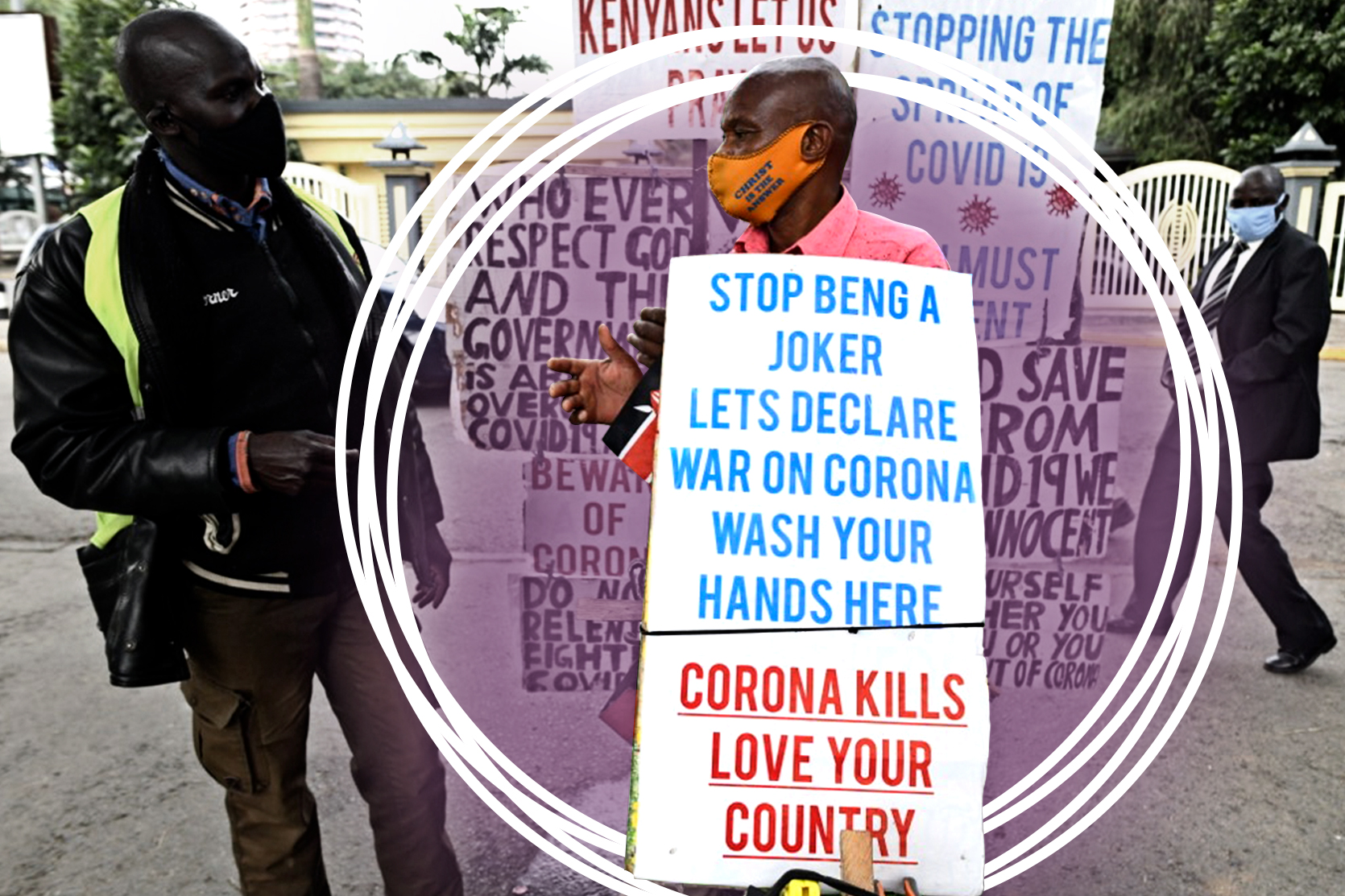Religion can help infuse a spirit of constitutionalism because when people abide by a just law they abide by certain fundamental principles

ZANU-PF election poster Photo: Graeme Williams
“Africans are notoriously religious,” asserts John Mbiti in his book African Religions and Philosophy. However, upon conducting a scan of the socio-political landscape of the continent, one is led to ask, if Africans are so religious then why are they so notorious?
Africa is notorious for its poverty, for its ethnic conflicts and civil wars, for its disease-scourged populations and for its constitutional delinquency.
Why does the religious African have to search for heaven in Europe and other lands? Why can’t she be enabled by her religiosity to create her own heaven here in Africa, here in Zimbabwe? Or has religion’s influence in African politics been too limited to have any palpable impact? Can the power of religion be harnessed and employed as a political force for good?
In a context where various means of ensuring social justice and respect for the rule of law by political leaders has yielded limited effect, can religion be the institution through which a sense of moral duty to obedience to the law is inculcated among people? This article seeks to explore these pertinent questions that centre on the relationship between religion and constitutionalism.
Observations have been made on the fact that many African countries have relatively good and progressive constitutions in that these constitutions express sound political, social and legal principles on the manner in which nation states ought be governed.
Politically, they provide for sound governance systems, processes and practices such as separation of power among the three branches of government and guarantee periodic elections. Socially, they present appealing values and principles such as equality, respect for human rights and supremacy of the constitution.
Legally, they make guarantees for the protection of human rights, access to justice for all and for ensuring transparency and accountability in governance processes and relations among citizens. The 2013 Zimbabwean Constitution fits this description. However, while many such constitutions could be regarded as good, it has been as widely noted as is evident that what most African countries lack is a spirit of constitutionalism – the value for the concept of law and subscription to its supremacy.
Although the closing years of the 20th century saw a gradual setting in of democracy (or some semblance of it) in some African countries, the question of constitutionality remains a major concern. As seen in the Zimbabwean experience, a state’s having a constitution is not tantamount to its being governed constitutionally. As Okoth Ogendo observes, although virtually all African states have constitutions, the full state of constitutional governance is yet to be attained in most of them. Ogendo identifies fidelity to life under the law as the fundamental principle of constitutionalism. Governance becomes constitutional only when those entrusted with the responsibility of administering state institutions adhere to the established principles and rules embedded within a just constitution.
In Zimbabwe there evidently exists an inadequate conception of law and its relationship to power. The result of this has been the existence of a fraudulent relationship between the government and the Constitution, characterised by deliberate subversion to the dictates of the Constitution, attitudes that view the Constitution as a liability and setback to party-political ambitions, and the use of the Constitution as an instrument of political warfare at the disposal of the ruling party against opponents.
As such, Zimbabweans are yet to experience what it means and feels to be citizens of a polity that is genuinely constitutionally governed. My prognosis is that for many this will only come as a reward in the afterlife!
I would like to submit that the crisis of constitutionality in Zimbabwe, and Africa in general, is at a fundamental level, not one of leadership and governance, but an ontological and existential crisis.
What is revealed by this crisis of constitutionalism and the accompanying social injustice that people suffer is that we (and particularly political leaders) saunter through our political lives without being nagged by certain important questions: What does it mean to be? What does it mean to exist in the same political space with others?
What moral, political, and, if we may add, constitutional imperatives are derivable from a consideration of these questions? Who are we as persons and as a people/nation and how ought we to relate to each other in a manner that allows everyone’s life to flourish? We cannot recuse ourselves from these ontological and existential questions if we desire politics that works for the common good.
Abdicating the intellectual and existential duty to consider these questions breeds narrow social imaginaries characterised by leaders and followers whose sense and imagination of social existence is not comprehensive enough to be nationally inclusive.
Fidelity of life under the law, a fundamental principle of constitutionalism, will thus take secondary priority after fidelity to the narrow and non-encompassing interests of a single political party. It is therefore exigent that citizens of a country and their leaders be invited to a certain level of depth as far as political discernment and discourse is concerned. And here, I contend, is where religion finds its political relevance.
Much has been written on the topic of the relationship between religion and politics and particularly on the role of the church in politics (I am confining my discussion to Christianity as it is the religious experience of the majority of Zimbabweans).
The debate on this has itself been raging for centuries, with a significant part of it being driven by politicians’ and statesmen’s resentment of the influence of the church in the public sphere. Since the 1648 Peace of Westphalia that gave rise to the modern nation state, and that saw the erosion of the temporal power of the Catholic church in Europe, the idea of the separation of state and religion has been ardently defended by many. But that loss of political power by the church did not stop it from exerting its influence in the political processes of the many countries in which it is established, including in Zimbabwe.
The church (Catholic, Protestant [and later] evangelical churches) has interacted with Zimbabwean politics from as far back as the arrival of the first missionaries. When settler colonialism began, this interaction served the interests and ambitions of both the church and the colonialists. It is not within the scope of this article to pass judgement on these relations.
Neither do I think it is helpful to be anachronistic by judging those relations using categories of our contemporary context. With time, however, there were seismic shifts in the common ground on which stood the interests of state and church. With the introduction of repressive laws, particularly through the 1969 Constitution passed after the Unilateral Declaration of Independence (UDI), the church’s challenge to the state intensified.
One notable champion of multiparty democracy, racial equality and just constitutionalism was Bishop Donal Lamont, the Catholic bishop for Mutare diocese from 1957 to 1981. His strong opposition to the UDI, the 1969 Constitution, and his support for nationalists, enraged the Smith government to the extent that his Rhodesian citizenship was revoked, leading to his deportation to Ireland in 1977.
After independence, with the growing abuse of power and infringement on human rights by Robert Mugabe’s government, the church’s voice echoed still. There has since been strong collaboration between the main church mother bodies on social justice advocacy. It has, of course, been convenient for the government to warn the church against involving itself in politics, yet the church played a central role in the struggle for just constitutionalism and independence.
The role of the church in ensuring constitutionality is not limited to activism and pastoral pronouncements. The principal argument of this article, following the discussion above on the crisis of constitutionalism as an ontological and existential crisis, is that religion can provide an eternal reminder of what people ought to strive for as a nation.
As regards the Constitution (and as an antithesis to those that argue that religion has no place in politics), one can assert that the Constitution (of Zimbabwe and many other countries) is in some respect a theological (hence religious) statement. It affirms that all have been created equal (by God).
This is the basis of the inalienable dignity that all people have, and the basis of human rights and our believe in the sanctity of those rights. Constitutionality, therefore, is adherence partly to that fundamental first (and religious) principle. It is therefore a prerogative of religion, among other institutions, to remind people of this truth.
Religion can invite people to a consideration of those existential values that ought to underpin our laws. At the heart of these values are love (respect for the dignity of the other), peace and justice. Religion can help infuse a spirit of constitutionalism, because when people abide by a just law they abide by certain fundamental principles at what is core to their beliefs about humanity. The Constitution is not just a legal document; it is aspirational and inspirational, inviting all to a more perfect state of social existence.
The above is better expressed by Georg Hegel in his social and political thought. For Hegel, the law is not an external imposition but an expression of the individual’s will. It is not some external coercive device instituted by some authority but an extension of an individual’s own self-consciousness.
Hegel conceives of the state as the consciousness of freedom. He describes it as “the actuality of concrete freedom”, concrete freedom being the consciousness by an individual that his fulfilment can only be realised within the milieu of the collective, and the latter’s awareness that the collective interests are better served by considering those of the individual.
In the state, the subjective wills of individuals are harmonised into a universal will. The state and its institutions thus become an embodiment of its citizens’ wills, a reflection of their freedom. The state, far from being just a protector of individual rights and provider for the subjective freedom and welfare of individuals, “[…] is one in which the individual good of its members is brought into rational harmony and grounded in a collective end, which its members understand and pursue both spontaneously and rationally for its own sake”.
This Hegelian understanding is, of course, far from being realised in reality. It is an ideal. In many African countries the reality is closer to Karl Marx’s observations about state and class relations. For Marx, theorising on the capitalist state, political power is “merely the organised power of one class for oppressing another”.
This has largely been the nature of the Zimbabwean state, even prior to independence. Footprints of class interests and class struggle for power are discernible in the constitutional processes that Zimbabwe has undertaken before and after independence. In the 2013 Constitution itself one can still sense the tension between the old order and the new order. Citizens that identify with the “new order” feel alienated from the state, which continues to represent the interests of a class composed of a few that seek, at all cost, to preserve their privilege.
The Church’s strength in promoting constitutionalism lies in its being a non-politically aligned institution, in its not being bound to any particular political system, and in its embrace of different political communities. It is thus arguably better placed, more than any other institution, to mediate constitutional discourse.
Suggesting this role for the church, however, is not unproblematic. The church has its own weaknesses. It is sometimes hit by scandals that threaten its moral authority. There is a lack of unity among different churches, some of whom resent the idea of religion’s involvement in politics. Churches are at different levels of ecclesiological and theological maturity, from the 2,000-year-old Catholic church, with centralised and hierarchical authority, to the 500-year-old Lutheran church, and further down to a church that is a couple of years old and has no centralised authority or systematic doctrine.
The structure of the church and the content of its theology (and especially social doctrine) determine the breadth and depth of its involvement in social-justice advocacy. Notwithstanding these ecclesiological challenges, the church, as the sign and safeguard of the supreme value of the human person, can and should see her role as that of promoting respect for the Constitution, as the Constitution ought to legally guarantee and promote human flourishing.
Father Arnold Moyo is a Jesuit Catholic priest and is currently the Director of Silveira House Jesuit Social Justice and Development Centre in Harare, Zimbabwe. He holds a BA Hon in philosophy from the University of Zimbabwe, a BA in theology from the Catholic University of Eastern Africa, and an MSc in development studies from SOAS University of London.










I was able to find good advice from your articles.
Hi Gerard,
Many thanks for your response and your kind words. Kindly keep an eye on our page for more*